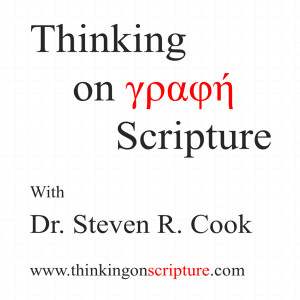
Monday Mar 11, 2019
Joel 2:18-32
The main idea of the passage is that God restores Israel’s prosperity after they return to Him and then pronounces a future day of the Lord scenario. The NASB translates Joel 2:18-19 in the future tense, but other translations render it in the past tense, as “He had compassion on his people” (Joe 2:18 NET) and “The LORD responded to his people” (Joe 2:19 NET; cf. ESV, CSB, NIV). “The Hebrew verb forms used here are preterites with vav consecutive and are most naturally understood as describing a past situation…It appears from the verbs of vv. 18–19 that at the time of Joel’s writing this book the events of successive waves of locust invasion and conditions of drought had almost run their course and the people had now begun to turn to the Lord.”[1] As a result of Israel’s returning to God, the Lord restored their agricultural blessings in accordance with His promise (Joe 2:18-19; cf. Deut. 28:12). Furthermore, He promised to remove the locusts which were destroying the crops (Joe 2:20). God even spoke kindly to the land and animals, assuring that green vegetation would return (Joe 2:21-22). To His people, God would send rain upon the land and they would again enjoy grain, wine and oil (Joe 2:23-24). The Lord would make up for the years of devastation produced by the locusts, which He calls “My great army which I sent among you” (Joe 2:25). From these events Israel was to know God was in their midst, and He controlled blessing and cursing, and that lifting the curse was a sign His relationship with His people had been restored (Joe 2:26-27). Joel 2:28-32 begins a new chapter in the Hebrew Bible and marks it 3:1-5 (BHS). This means Joel chapter 3 in the English translation is chapter 4 in the Hebrew Bible. Joel then prophesied about a distant future time in which God would pour out His Spirit upon all classes of people without regard to age, gender, or social classification (Joe 2:28-29). This bestowal of His Spirit and outpouring of divine revelation indicated God’s blessing upon believers. However, there is also a picture of judgment, in which God “will display wonders in the sky and on the earth, blood, fire and columns of smoke. The sun will be turned into darkness and the moon into blood before the great and awesome day of the LORD comes” (Joe 2:30-31). This judgment most likely describes the seven year Tribulation which falls upon unbelievers (see Rev. 6:12-13). Though God is judging unbelievers during the Tribulation, there is still grace, for “it will come about that whoever calls on the name of the LORD will be delivered; for on Mount Zion and in Jerusalem there will be those who escape, as the LORD has said, even among the survivors whom the LORD calls” (Joe 2:32). Paul gave this verse spiritual meaning in Romans 10:13. Peter quoted Joel 2:28-32 when explaining the outpouring of the Holy Spirit on the day of Pentecost (Acts 2:16-21). Peter did not mean that Joel 2:28-32 was fulfilled on that day, but that what Joel described—especially concerning the outpouring of the Holy Spirit—was analogous to what God was doing among believers at the beginning of the dispensation of the church age.
[1] Biblical Studies Press, The NET Bible First Edition Notes (Biblical Studies Press, 2006), Joe 2:18.
No comments yet. Be the first to say something!